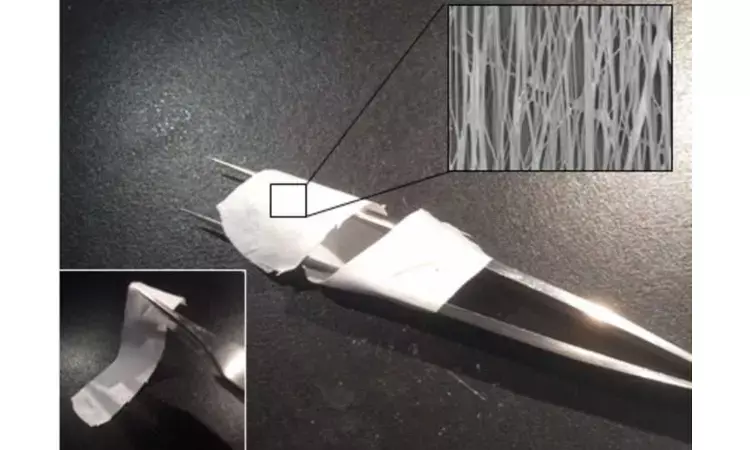- Home
- Medical news & Guidelines
- Anesthesiology
- Cardiology and CTVS
- Critical Care
- Dentistry
- Dermatology
- Diabetes and Endocrinology
- ENT
- Gastroenterology
- Medicine
- Nephrology
- Neurology
- Obstretics-Gynaecology
- Oncology
- Ophthalmology
- Orthopaedics
- Pediatrics-Neonatology
- Psychiatry
- Pulmonology
- Radiology
- Surgery
- Urology
- Laboratory Medicine
- Diet
- Nursing
- Paramedical
- Physiotherapy
- Health news
- Fact Check
- Bone Health Fact Check
- Brain Health Fact Check
- Cancer Related Fact Check
- Child Care Fact Check
- Dental and oral health fact check
- Diabetes and metabolic health fact check
- Diet and Nutrition Fact Check
- Eye and ENT Care Fact Check
- Fitness fact check
- Gut health fact check
- Heart health fact check
- Kidney health fact check
- Medical education fact check
- Men's health fact check
- Respiratory fact check
- Skin and hair care fact check
- Vaccine and Immunization fact check
- Women's health fact check
- AYUSH
- State News
- Andaman and Nicobar Islands
- Andhra Pradesh
- Arunachal Pradesh
- Assam
- Bihar
- Chandigarh
- Chattisgarh
- Dadra and Nagar Haveli
- Daman and Diu
- Delhi
- Goa
- Gujarat
- Haryana
- Himachal Pradesh
- Jammu & Kashmir
- Jharkhand
- Karnataka
- Kerala
- Ladakh
- Lakshadweep
- Madhya Pradesh
- Maharashtra
- Manipur
- Meghalaya
- Mizoram
- Nagaland
- Odisha
- Puducherry
- Punjab
- Rajasthan
- Sikkim
- Tamil Nadu
- Telangana
- Tripura
- Uttar Pradesh
- Uttrakhand
- West Bengal
- Medical Education
- Industry
Electrical therapy with exercise, promising treatment of tendon disease or ruptures: Study

An electrical charge is produced in the damaged or injured tendon when the implanted device is stretched during walking. The electrical stimulus turns on tendon-specific regenerative processes in the damaged tendon.
Ireland: A recent study in the journal Advanced Materials has shown that tendon cell function and repair can be controlled through electrical stimulation from an implantable device that is powered by body movement.
The researchers demonstrated how a simple act of walking can power an implantable stimulator device to speed up the treatment of musculoskeletal diseases.
The research establishes the engineering foundations for a new range of stimulator devices that enable control of musculoskeletal tissue regeneration to treat tendon damage and disease and sports injuries, without the use of drugs or external stimulation.
Lead researcher on the study, CÚRAM Investigator Dr Manus Biggs, said: "One of the most exciting parts of our study is that these implantable devices may be tailored to individual patients or disorders and may show promise in accelerating the repair of sport-related tendon injuries, particularly in athletes."
The study investigated whether electrical therapy, coupled with exercise, would show promise in treating tendon disease or ruptures. It showed that tendon cell function and repair can be controlled through electrical stimulation from an implantable device which is powered by body movement.
Dr Marc Fernandez, who carried out the principal research of the study at CÚRAM, said: "Successful treatment of tendon damage and disease represents a critical medical challenge.
"Our discovery shows that an electrical charge is produced in the treatment target area -- the damaged or injured tendon -- when the implanted device is stretched during walking. The potential gamechanger here is like a power switch in a cell -- the electrical stimulus turns on tendon-specific regenerative processes in the damaged tendon."
The stimulator device uses a fabric like mesh -- known as a piezoelectric material -- that produces electricity when stretched or put under mechanical pressure. It is made using a scaffold of nano-fibres which are one-thousandth of the thickness of a human hair
Dr Fernandez added: "We presented an implantable, electrically active device capable of controlling tendon regeneration and healing. Importantly, our research improved the therapeutic performance of the device by enhancing its structure, piezoelectric characteristics, and biological compatibility.
"We also evaluated the individual influence of mechanical, structural, and electrical cues on tendon cell function and were able to show that bioelectric cues contribute significantly in promoting tendon repair."
Dr Biggs added: "This unique strategy of combining a device which is powered through body-movement and which can induce accelerated tendon healing is expected to significantly impact the field of regenerative devices, specifically in the area of sports or trauma associated injuries.
"These devices are cost-effective, relatively easy to implant and may pave the way for a whole new class of regenerative electrical therapies."
The research was funded by Science Foundation Ireland and in particular the SFI-BBSRC Partnership programme.
CÚRAM's research focuses on developing diagnostic devices, biomedical implants, cell-device and drug-device combination products to address unmet clinical needs.
Reference:
The study titled, "A Self-Powered Piezo-Bioelectric Device Regulates Tendon Repair-Associated Signaling Pathways through Modulation of Mechanosensitive Ion Channels," is published in the journal Advanced Materials.
DOI: https://onlinelibrary.wiley.com/doi/10.1002/adma.202008788
Hina Zahid Joined Medical Dialogue in 2017 with a passion to work as a Reporter. She coordinates with various national and international journals and association and covers all the stories related to Medical guidelines, Medical Journals, rare medical surgeries as well as all the updates in the medical field. Email: editorial@medicaldialogues.in. Contact no. 011-43720751
Dr Kamal Kant Kohli-MBBS, DTCD- a chest specialist with more than 30 years of practice and a flair for writing clinical articles, Dr Kamal Kant Kohli joined Medical Dialogues as a Chief Editor of Medical News. Besides writing articles, as an editor, he proofreads and verifies all the medical content published on Medical Dialogues including those coming from journals, studies,medical conferences,guidelines etc. Email: drkohli@medicaldialogues.in. Contact no. 011-43720751


